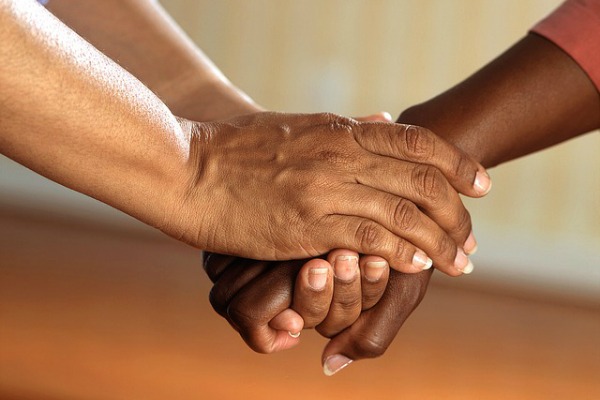What to Say (and NOT Say) To Your Friend with a Chronic Illness
You’re flaky. You just want attention. It’s all in your head. You just need to tough it out.
I’ve heard every single one of these things…. But I think if anyone could see the countless hours I’ve spent crying, praying, and lying in bed because even walking around is too painful — well, I think they’d change their tune.
It’s a grim picture, but for people with a chronic illness, it’s more than a picture — it’s life.
I don’t think anyone would argue that being sick is horrible. It’s exhausting, discouraging, and sometimes makes you wonder if you’ll ever feel normal again.
Imagine feeling that way 24/7.
Chronic illness is debilitating in so many ways, but sometimes even worse than the physical pain is the emotional pain. Having someone tell you that you’re flaky or that you’re weak when you’re in tremendous pain is like having someone kick you over and over when you’re trying to get up.
On the other hand, having someone encourage you and show compassion when you’re struggling makes all the difference in the world.
When my husband and I first got married, he experienced my chronic illness in a way he never had before. As I would lie in bed at night crying and shaking in pain, he would hold my hand and tell me he felt so helpless. I thought about that a lot — I knew having an illness was hard for me, but I didn’t realize how hard it could be for the people around me who wanted to help.
The painful truth is that when someone you love and care about has a chronic illness, you can’t take the pain away. But there are so many other really simple things that you can do to help.
So that’s why I wrote this article: to help those who are suffering to feel understood and to help those standing on the sidelines know how to understand.
Never, Ever, EVER Call Your Friend Flaky
 I seriously can’t emphasize this enough. Being sick and having frequent flare ups means that your friend is occasionally going to have to cancel plans at the drop of a hat… And doing that isn’t easy. Honestly, it’s humiliating. I can’t tell you how many invitations I’ve had to cancel at the last minute — and every single time, without fail, I worry that the other person is going to think I’m making up being sick.
I seriously can’t emphasize this enough. Being sick and having frequent flare ups means that your friend is occasionally going to have to cancel plans at the drop of a hat… And doing that isn’t easy. Honestly, it’s humiliating. I can’t tell you how many invitations I’ve had to cancel at the last minute — and every single time, without fail, I worry that the other person is going to think I’m making up being sick.
So how do you handle it when your friend cancels plans? Again?
Let me tell you a story that happened to me just a few weeks ago that healed my heart and helped me to feel loved and understood.
My husband and I are sometimes assigned to teach one of the Sunday School classes in our ward. A few weeks ago, when it was our turn, I had gotten up and gotten ready; then, right before we left, a horrendous stomach ache attacked. I texted the person who is in charge of making assignments to let him know we weren’t going to make it to church. (A lot of times when I’m really sick, my husband stays home to take care of me and comfort me because I get really scared being in so much pain. I’ll get more into that later.)
I wrote, “Hey Mark. This is Amy Keim from church. We were all ready to go but my stomach started hurting really bad (I have chronic stomach problems which is why we miss church too often ?). Could you guys possibly combine with the other class? Or I can send you all the videos we were going to use.”
I felt HORRIBLE, and not just physically. I felt like I was messing everything up and that, as always, I was letting people down. I worried that he would think I was making it up because I didn’t want to teach. I felt sick, embarrassed, and vulnerable.
His response, though, made all the difference in the world.
He wrote back a few hours later, “Sorry! I just got this. I’m so sorry, Amy. We took care of the lesson and everything worked out great. No worries and hope you feel better soon. You never need to feel bad for missing for that reason, I hope you guys know. I have a brother who had ulcerative colitis and it was so sad and difficult.”
His text made me cry, but happy tears this time. I had been so worried that he would think I was a wuss and that I was a huge flake, but his kind response made me feel like someone not only trusted me, but cared about me — and he hardly even knew me! When I was feeling incredibly discouraged and down, his response lifted me up and made me feel worthwhile.
So when your friend cancels at the last minute, please resist the impulse to get mad. Not responding or responding with something negative is going to make your friend, who already feels terrible, feel even worse.
Instead, tell them you understand — or if you don’t understand, that you wish you did. Tell them that you’re sorry; that you know it must be hard to be so sick. Be genuine, compassionate, and kind.
Don’t Diagnose
 This one is tricky! Often when you try to diagnose your friend, you’re doing it out of love because you care about them and want to get to the bottom of whatever is making them so sick all the time.
This one is tricky! Often when you try to diagnose your friend, you’re doing it out of love because you care about them and want to get to the bottom of whatever is making them so sick all the time.
So let me let you in on a secret: it’s all in the approach.
When you want to suggest to your friend that they should try something, here’s a do-and-don’t example of what to do.
Don’t: “You need to stop eating ___. You need to get off of this medication. You need to see this doctor. You shouldn’t be doing ____.”
Basically, just don’t assume that you know exactly what they need to do. Cut out the “you need to”s and the “you shouldn’t be”s.
Do: “Have you ever thought about cutting out these foods? I’ve heard that some people have success with this remedy; maybe you could try it? I have a friend who visited this doctor, and they really helped her — can I give you their number? I wonder if doing ___ is making things worse?”
Even when someone is making obvious suggestions (for instance, people ask me all the time if I’ve tried cutting out gluten or dairy — I have), if they do it out of love and approach it kindly, I’m touched that they were thinking of me. But if someone tells me when I need to be doing, assuming they know my body better than I (or my doctors) do, it makes me feel frustrated, hurt, and misunderstood.
Understand That Breakdowns, Anxiety, and Depression are All Normal and Expected
 That one’s pretty self-explanatory, but I’ll expound just a little. When you are sick all the time, you’re going to have breakdowns — probably regularly if you’re anything like me. Every few weeks after a bad stomach ache, I get SUPER discouraged. I cry — like, a lot. I tell my husband, “What kind of life is this? I can’t do anything. Why can’t I be normal?” and so on and so forth.
That one’s pretty self-explanatory, but I’ll expound just a little. When you are sick all the time, you’re going to have breakdowns — probably regularly if you’re anything like me. Every few weeks after a bad stomach ache, I get SUPER discouraged. I cry — like, a lot. I tell my husband, “What kind of life is this? I can’t do anything. Why can’t I be normal?” and so on and so forth.
There’s not really much you can do when your friend or loved one is having a break down like this other than listen. Just listen and love them. Andddd…
Ask What They Need
 I’m not talking about asking if you can go to the store to get them anything, although that is super nice and thoughtful. Typically, your friend has all the equipment and tools they need because they’re unfortunately used to being sick.
I’m not talking about asking if you can go to the store to get them anything, although that is super nice and thoughtful. Typically, your friend has all the equipment and tools they need because they’re unfortunately used to being sick.
Instead, ask what comforts them: having someone with them? Telling them they’ll be okay? Being hugged or having their hand held?
I’ll give you a quick example. When I’m sick, for whatever reason, the only person I really want around is my husband. It’s not that I don’t love my friends, but my friends can’t follow me into the bathroom and stroke my hair when I’m violently ill. (I mean, I guess they could, but…. I think it would be uncomfortable for all parties involved. Hah.)
My husband, who, as I mentioned before, told me he felt helpless, is actually the biggest comfort to me. I thought for a while about what he could do so that he doesn’t feel helpless when I’m sick, and I realized there was something vital he could do: he could tell me that I’m going to be okay.
I don’t know if everyone is like this, but when I get really, really sick, I get really, really scared. Sometimes I’m almost positive I’m going to die. So I told my husband, “When I tell you I’m scared, I need you to tell me I’m going to be okay. If you get scared too (or tell me you’re really scared, at least), I get even more scared. So just tell me I’m going to be okay.”
And he does. When I say, “I’m scared. I’m scared I’m going to die,” he responds, “You’re going to be okay. You’re not going to die. You’ve been through this before and you’ve gotten through it. I’m sorry that you’re scared; I know it hurts really bad. But you’re going to be okay.”
That may not work for everyone, but it works for me. So ask your loved one what they need when they’re sick! Simply trying to understand your friend will mean everything to them.
So basically it comes down to this: don’t judge. Be kind. Treat your friend how you would want to be treated if you were sick.
It will mean so much more than you know.
PS — Comment what helps you when you’re sick or what thing you wish people knew about your chronic illness! I’d love to make more lists in the future, even if they’re just short snippets, about what to do when you (or a loved one) has a chronic illness, so your suggestions will really help me out!
This article was originally published on LDS Blogs.


